Hunter Recruitment: How Bird Hunting is Helping in the R3 Fight
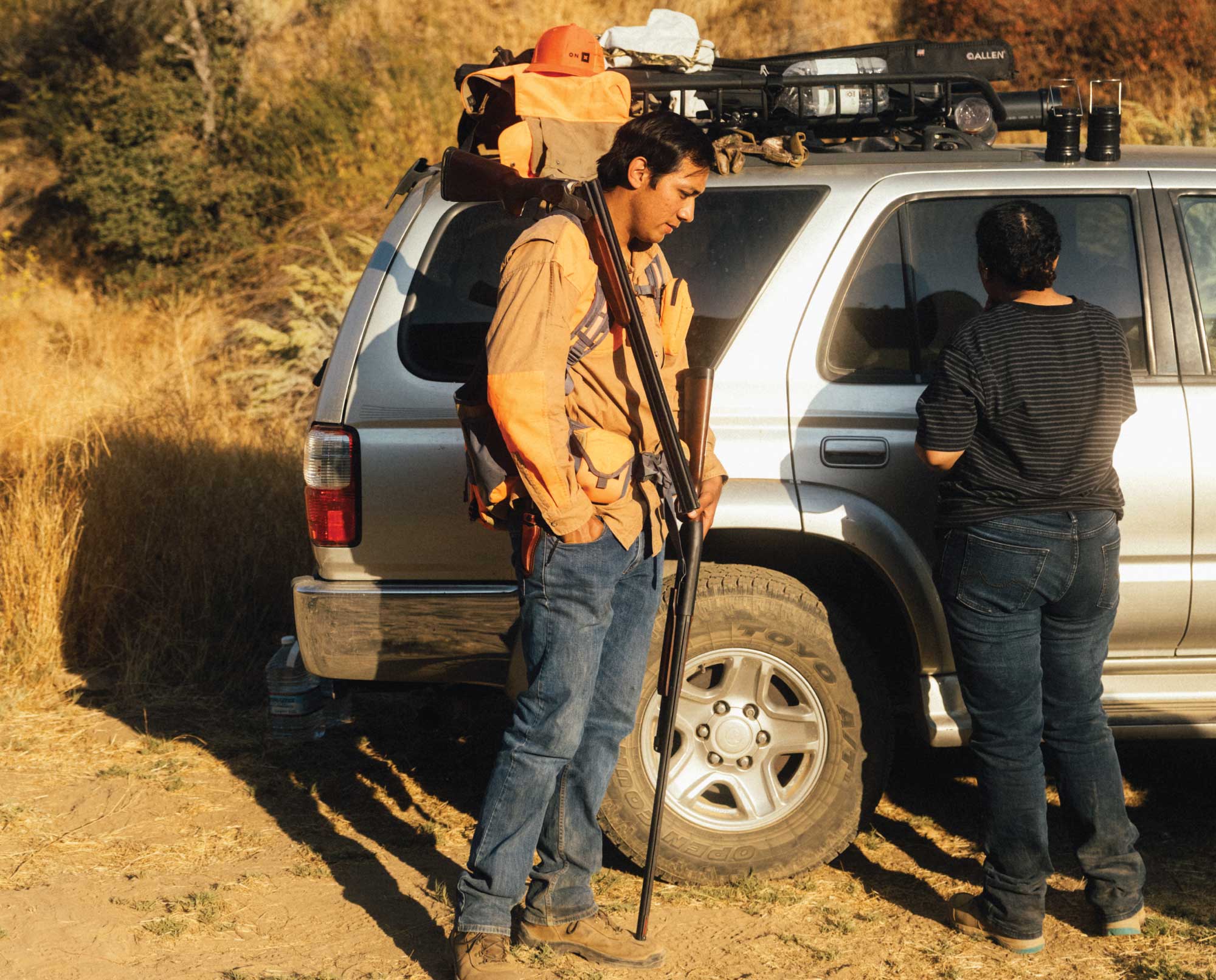
Bird hunting is at the forefront of hunter recruitment in the United States.
Doom and gloom seems to be all headlines lately when it comes to hunter numbers in the United States. The 2016 survey by the U.S. Fish and Wildlife Service put the hunting population at 4.4 percent, or 11.5 million hunters. In 1991, 7.3 percent of the U.S. population hunted, or 14.1 million people. That means we have lost 2.6 million hunters in the past 25 years. But that number becomes even scarier when compared to the U.S. population: it represents about a 40 percent loss in hunters from the overall population and has given birth to the R3 Movement.
READ: What is R3 in Hunting?
So why does it matter?
It matters because the Pittman-Robertson Fund makes up over 60 percent of the budget in the United States for local, state and federal conservation efforts. The money that goes into the Pittman-Robertson is from taxes on firearms, ammunition and archery equipment. When the number of hunters goes down, less revenue is generated and fewer funds are available to help conservation efforts. Add in the fact that states depend on hunting license fees and permits to even be eligible for the Pittman-Robertson and things get even messier.
Why is this happening?
There are certainly a lot of factors at play, but at the core — hunting has major PR problems. As hunters we are pointing fingers in all directions, but the harsh reality is, we only have ourselves to blame. As a culture we have isolated ourselves from the masses. Sure, not all of us, but the image portrayed by the vast majority of the hunting community to non-hunters is nothing to brag about. Our pursuit has become stagnant and we have not evolved with the times. We have dominated our media with a take-it-or-leave-it, one-sided perspective without the appeal of diverse opinions, traditions and backgrounds.
We aren’t talking about selling hunting to hunters here. We are talking about actually reaching new hunters. To even gain the interest of these folks we aren’t just competing against other outdoor pursuits. We are competing for attention as commanding as a Star Wars film release.
In the 2018 National Upland Hunting Survey we recently conducted, we dissected aspects of the perception of hunting, specifically looking into the use of the word “sport” as it pertains to hunting. The word “sport” is defined as “an activity involving physical exertion and skill in which an individual or team competes against another or others for entertainment.”
When we asked the survey respondents their opinion of hunting as “an activity in which an individual competes against another or others for entertainment” over 90 percent of our audience rejected it as a definition of upland hunting with overwhelmingly strong opposition. (Read: The Word Sport in Hunting)
The results painted a clear picture that even our own terminology was working against us. When asked essentially the same question on their opinion/perception of the word “sport” in comparison with the definition, even hunters themselves have an overwhelming distaste for what the word actually implies in regards to hunting. If hunters don’t agree with it, how does someone who has no idea about the history of hunting perceive this notion?
What’s the good news?
The good news is that not all media outlets are afraid of change or set on catering to broken methods of communication. The 2018 National Upland Hunting Survey revealed that Project Upland recorded a 30 percent following of first-generation hunters — that is, a hunter who did not grow up in a hunting family. Add in a 20 percent female following along with innovative age demographics and there IS light at the end of the tunnel. We are also breaking the urban and suburban development myth with a 55 percent following hailing from non-rural communities, proving that urban populations will in fact accept a future with hunters.
By making a strong effort to empower new hunters and inspire them through positive and cutting-edge media, everyone within the Project Upland community is helping to turn the tide on hunter recruitment. And by normalizing women in the outdoors, accepting new ideology in outdoor pursuits, and making all people feel accepted, the upland community is leading the race to save hunting.
What will the hunting population look like in the future?
There is no secret that in the future, hunting populations in the United States will look far different than they do today. Trends point towards a greater concentration of women, higher participation from urban dwellers, increased minority representation, and the hidden gem – an increase in small game hunting. One only need look at past data where in the 1980s there were twice as many small game hunters as big game hunters in the United States. Today the opposite is true.
Many believe the scales are going to tip back towards greater interest in small game hunting with the influx of first generation hunters. Many cite the “repeatably” of small game hunting as well as the higher chances of success and lower barriers of meat processing and handling.
Add in the impact of a recent study about using bird dogs in R3 as an effective method for garnering interests in hunting and we begin to see an even more promising picture of how bird hunting will effectively change the future landscape of hunting.
What can we all do to help?
Many have said it before: if we all took it upon ourselves to mentor just one new hunter from start to finish, we could solve this issue inside of this decade. We ask our community to continue putting the future of hunting as a top priority to make sure that we do in fact save the pursuit we all love so much.
It is important to know that as we grow our numbers, we will grow our voice and more importantly, our acceptance. That acceptance will lead to more awareness, more habitat, more access, more hunters and ultimately, the continuation of the North American Model of Wildlife Conservation.
We as a community have made the commitment to inspire as many new hunters as we can, and it’s working. We will continue to provide anyone with interest as many tools as we are able to help advance their abilities to stay with hunting. We will continue to point them in the direction of state agencies and non-profits. As a community, we will continue to make upland hunting a model example of hunter recruitment in the 21st century.
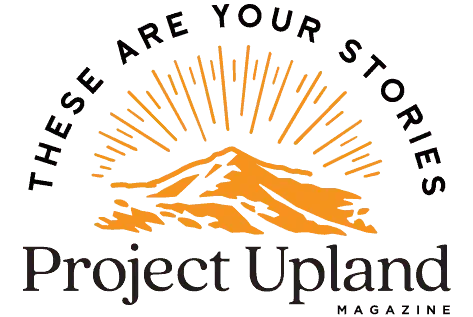


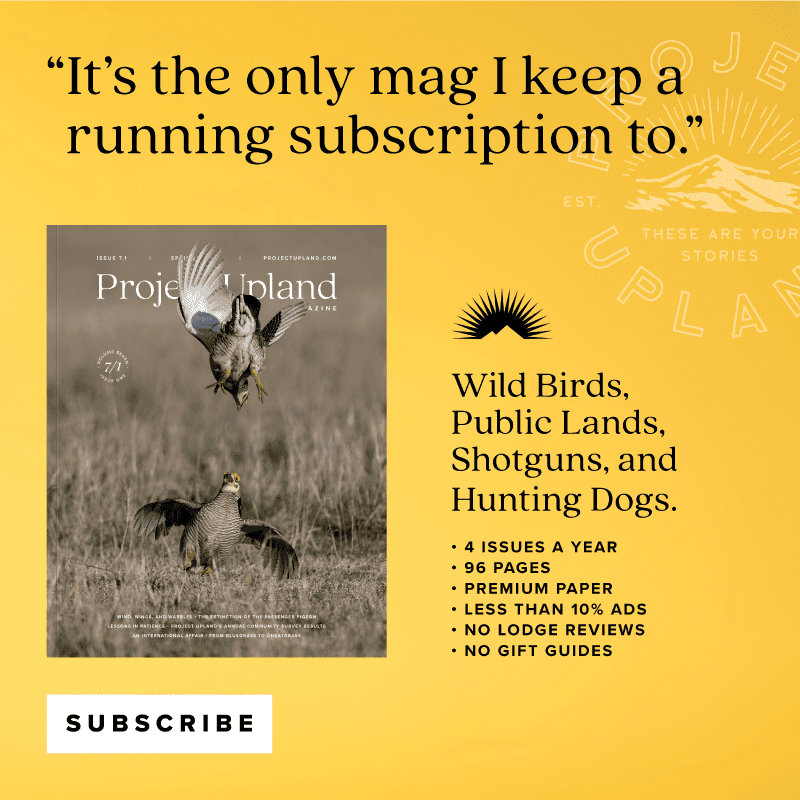
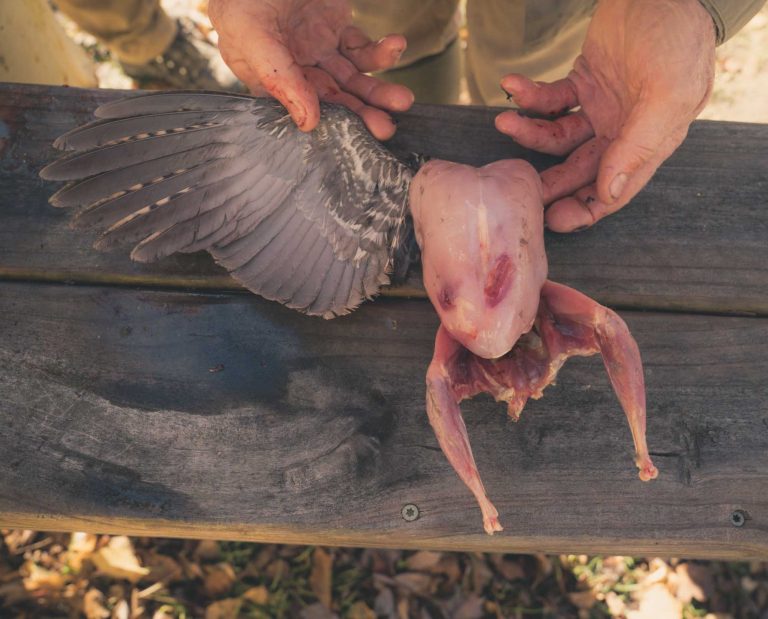
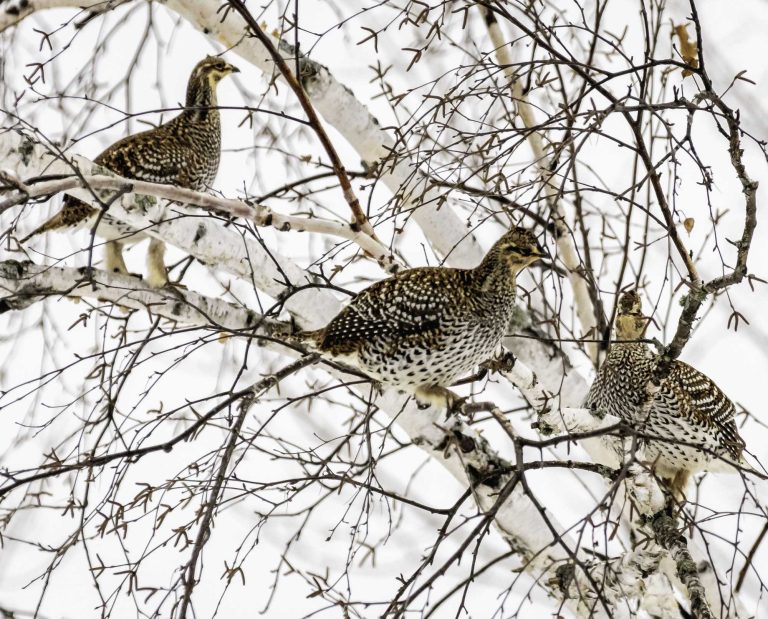
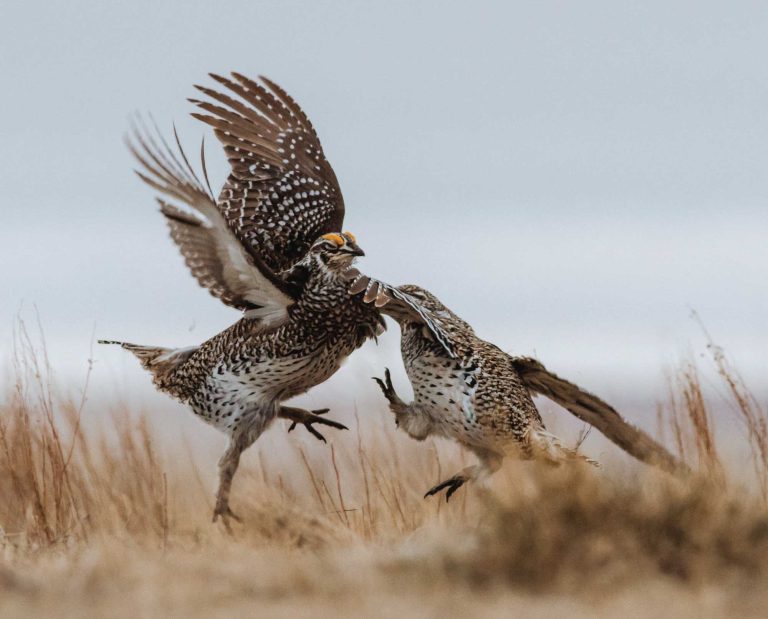
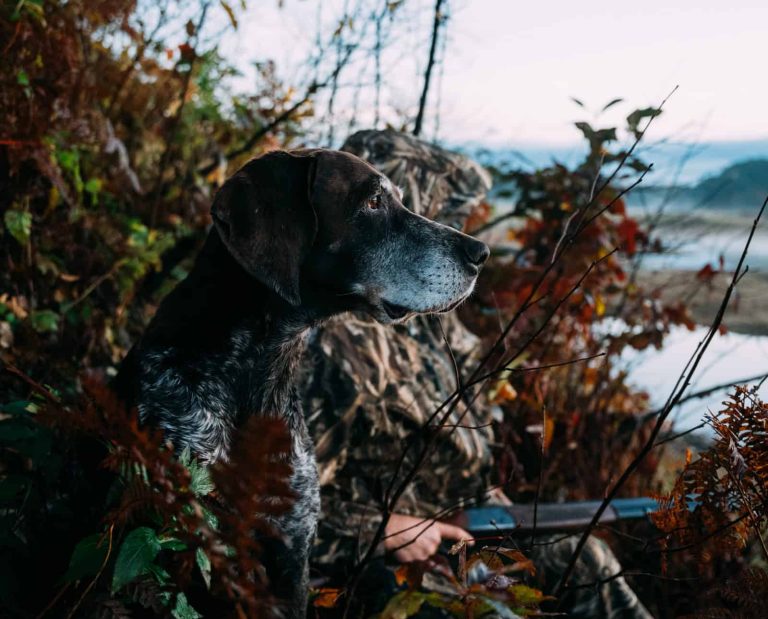
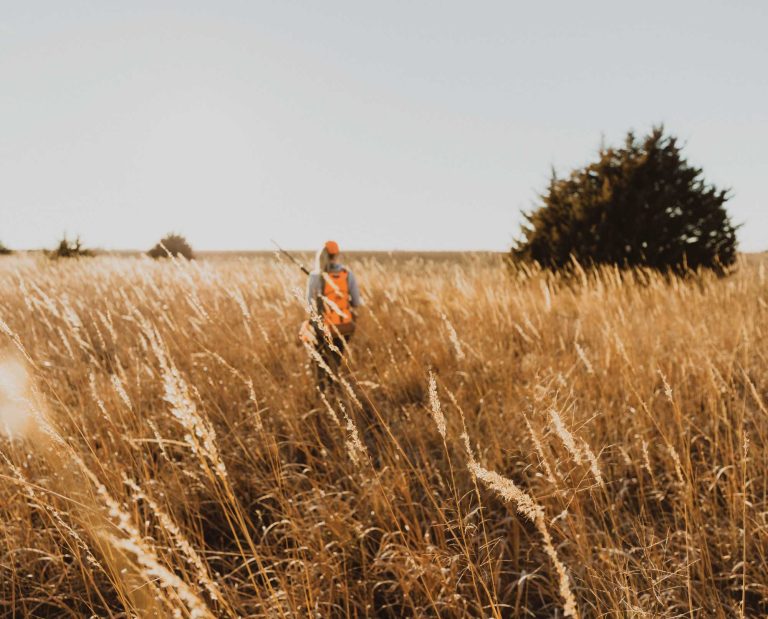
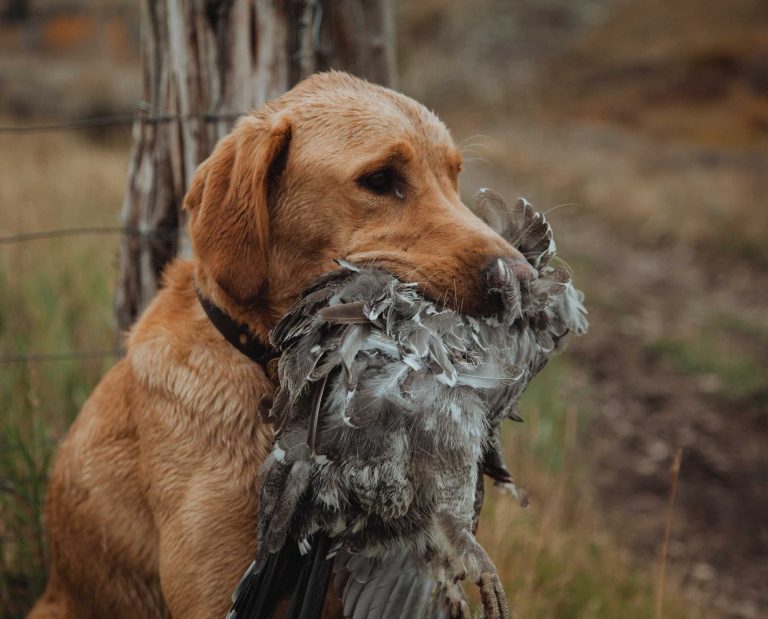
outstanding article, Jesse. Thanks for lots of food for thought … and action
This really may be the best article project upland has put out… and that is saying alot. I hope it inspires folks to take along someone new.
Great article. As a semi-competent dog trainer of many years, I grew a few years ago into a conversion to positive training for dogs. I see a virtual absence of the positive training model in the hunting sector today. I surmise that most of the growth potential for hunting lies with women and children. I can tell you from a good bit of experience that women and children are much more likely to take to the outdoors with their dog if they have a positive training model. Where are the outdoor cheerleaders for positive training for gundogs?
Best piece yet. Inspiring. And you are right about the mentoring. The demographics of your following are encouraging but it takes a mentor to get you out in the field with a gun. Can you use your site and lists to connect people?
In addition to PR, what do you think are the next biggest contributing factors to the decline? I would offer (with no empirical backup whatsoever) that access is a key problem. I love bird hunting here in Texas, and own a well-trained gun dog. But not being a landowner, that desire and dog don’t always translate into easy hunting opportunities. It is always a struggle to put hunts together, and they then can be relatively costly at that. Finding a lease is also a huge (and expensive) task. If I can’t find easy opportunities, then how can a new hunter? An intimidating prospect, I propose.
Outstanding article. Thanks for the thoughtful share Jesse!
Thank you Jesse. There’s an abundant native wild bird hard to kill, huntable in 29 states from ME to TX to CA to WI with a dog, farmers are glad to see us, easy on the pocketbook, with the most growth potential to get new hunters involved of anything, pursuing the grandest of all game birds, yet most people never heard of it. Call 920-776-1272 http://www.turkeydog.org/
Great article, great read. As a first generation hunter I have definitely been inspired by project upland and hope to find ways to contribute positively to the hunting community.
[…] hunting on the Illinois River with his dad. We also dive into the current state of outdoor media, new hunter recruitment, and discuss the younger generation of […]
Nice article! As a new hunter, coming from a non-hunter family, I think that maybe I can be part of the solution.
I don’t see hunting as a sport, but as a cultural matter; as a kind of human heritage; as a real bond between mankind and dogs; a process in the evolution in the fight for survival. It’s also a social activity, it does friends, teaches about life, and helps in conservation; it also has a gastronomic value. It is a lot more than just hunting; not in the way the non-hunters’ sight at it.
As a wingshooting lodge owner in Uruguay, I use to host US hunters who come to our lodge to experience our mixed-bag hunting outfitting, and I’ve seen a decrease in the number of hunters, because of their aging and there aren’t new ones coming.
On the other hand, when I look at the metrics on Facebook and Instagram, I see a bigger interest in the 25 – 35 years old ones and at a rate of 83 % male 17 % female; it means that may change in the future.
A few months ago, I’ve read an article about young people who are starting to think that game is quite better than processed food.
So, I think we might have to work on a few things: make a better PR, mentor young hunters on the matter, talk about the ethics of process your own game, and about the conservation efforts hunters are already doing.
People use to think that conservation means no killing. But we know increasing habitat is far more important than that. That’s why the amount of resources hunters are placing in habitat.
Then we have the dogs. I was hooked into hunting because of the wonderful work birddogs perform.
I think we should work to get Hunting to be listed as Human Heritage by the UN as falconry is.
That way, I expect we can start to revert hunting decrease.
One of the things we often talk about is access being a key, but I’d almost call that a half-truth. The key to access, is access to property _with birds_. Since I’m from IL I watch our numbers, and they look incredibly bad.
https://www.dnr.illinois.gov/hunting/uplandgame/Documents/Pheasant%20Status%20Report%202019.pdf – I expect hunter numbers and harvest across most of the Eastern half of the country is much the same as IL which has seen pheasant hunters drop from 200,000+ to less than 15,000 in the last 40 years. The reason isn’t just access. The birds are not there because 90% of the farms have _zero_ habitat for wild creatures. As a libertarian it pains me to say it, but farm policies are going to have to change if we want to protect our birds, and the environment in general. I don’t pretend to have _the_ answer, but we need to start a conversation about it. For instance, if we are going to federally subsidize crop insurance how about requiring farmers to implement “best practices” such as buffer strips along waterways, grassed waterways. Maybe we need a national push away from monoculture farming, and toward things like cover crops. As a farm owner that directly affects my pocket book, but I’m not sure why farmers should expect handouts from the government and not be expected to be supported by tax dollars while destroying wildlife habitat and polluting waterways with chemical runoff. Surely some balance could be found? That balance is absent here in the corn belt
[…] an aspiring hunter was more critical than it is today with the current R3 movement. In the 2018 National Upland Hunting Survey, aspiring hunters ranked having a mentor as the number onecomponent they sought before going […]